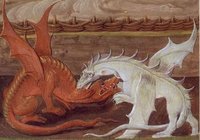1















| Thumbs Up |
| Received: 760 Given: 596 |


















| Thumbs Up |
| Received: 6,944 Given: 7,469 |

Upper Franks (of modern North Bavaria and North Baden-Wurttemberg) seemed to historically have Alemannic identity though. The region was a battleground between Franks and Alemanns, and the former ended up conquering the region from Alemanns in the end, which is is why they have Frankish identity today if I'm not mistaken. They belong to a distinct linguistic branch of Upper Germans from the Alemannish proper of BW and Switzerland, so they would've identified as something else before the region became under Alemannish rule. But yeah, don't think it was used by other German ethnicities/tribes historically. I recall reading that somewhere before, but could be misremembering.



















| Thumbs Up |
| Received: 6,944 Given: 7,469 |

It seems that the Heruli were also part of the tribal confederation that led to the Thuringians along with the Angles and Werns:
Could the Thuringian leben be connected to the lev in Schleswig?
Thuringians seem to have been recorded in South Holland alongside the Angles and Werns:
This would make sense as the English wouldn't have gone directly from Schleswig to Britain, but from Schleswig to the Netherlands/Belgium to Coastal Gaul to Britain. And this could also explain the English and Saxon toponyms in Northern France.
Source:
https://www.google.com/books/edition...AAAAMAAJ?hl=en
Also, info about Thuringian presence in Britain:
The author seems to be unaware that Thuringians originally lived up north along the coast alongside the Angles, but the highlight here is the presence of Thuringian objects in Britain.
By the way, which part of East Germany are you from?

















| Thumbs Up |
| Received: 14,056 Given: 6,632 |














| Thumbs Up |
| Received: 6,468 Given: 6,827 |

Suebi was an important endonym that was just reported by Tacitus. Again, Suebi were a religious-cultural confederation of various tribes. They were centered around the Semnones in later Brandenburg that kept the Suebi’s most important loction, the sacred grove of the Semnones. Roughly the area of Suebian tribes overlaps with the former GDR. The Baltic Sea was also referred to as the Mare Suebicum.
No no, High German is unrelated to all this. It emerged with the German sound shift at abt. 700 AD and seems to first have occurred among the Longobards in Northern Italy (implying that the ethnically dying Longobards were the first Germans in a narrow sense!). Before the German sound shift all Germanics spoke unshifted, Low German-like Germanic. The German soundshift is thought to have become evoked by a language contact with Vulgar Latin. It’s all a very secondary thing.
Aha! It’s not the name of a particular Germanic god but of a kind of gods. The Germanic gods are divided in Asen and Wanen (in German language, in English it’ll be resembling). So it’s like Ansgar (Oscar), Ansegisil etc. Still the reason for the k in Aesk is unclear to me. Maybe it’s a Frisian-like casual shortening of Ansgar/Oscar?
Yes, repeatedly in the evolution populations show to be derived essentially only from comparably small fractures of prior populations. This applies also to the evolution of species.
It was written in the Frisii Wikipedia arcticle that I had earlier linked:
„In the 3rd and 4th centuries the population of Frisia steadily decreased, and by the 5th century it dropped dramatically. Archaeological surveys indicate that only small pockets of the original population stayed behind (e.g. in the Groningen coastal marshes).[30] The coastal lands remained largely unpopulated for the next one or two centuries. As soon as conditions improved, Frisia received an influx of new settlers, mostly from regions later characterized as Saxon, and these would eventually be referred to as 'Frisians', though they were not necessarily descended from the ancient Frisii. It is these 'new Frisians' who are largely the ancestors of the medieval and modern Frisians.[5] Their Old Frisian language, however, was more intricately related to Old English spoken by their relatives settling abroad, than to the Old Saxon language spoken by the people staying behind in Germany.“
It was that one, however. The reason for me to call him wannabe was that he and his closer family simply did not traditionally speak Frisian in contrast to the other one. It took me much effort to „press“ out this information from him. He repeatedly avoided answering and eagerly explained to me why my question doesn’t matter.
I don’t know but that’s well possible. Now, my point is that the traditional Frisian speaker agreed with him that ”we” are all Saxo-Frisians no matter the language we speak because modern Frisians are disconnected from antique Frisii and in fact Saxons, however Sea Shore Saxons.
I see what you mean but with my Monnem example I wanted to point out that the question if the name of the town is Mannheim or Monnem is not dependent on the dialect (alone) but on the conservatism of the administration that decides what is the official name.
OMG. Then it’s even a home made mess…
Nice examples! It may be noted that words are often better conserved in foreign languages as they there often get „frozen“. So the Latin terms Holsatia and Alsatia conserve more of the origin. Or like the word kuningas (!) in Finnish for king.
Unfortunately not. The word is mostly considered related to German Anger, which means an agricultural used field. But it doesn’t really convince me.
I mean that I think that new names emerged when populations merged or split up rather than an identical population simply switched ist name. Without stating that such things didn’t occur.
*herut is a reasonable assumption!
Much is unclear but the derivation of the Ampsivarii from the Ems I consider completely sure. A number of scholars even think that it’s an emendation of Angrivarii because the Romans encountered them at the Ems river. However, the geographic connection to the Ems river is undisputed.
No. Except for if you refer to a particular local area. In regard to that this is even one of the theories of the name (all men).
Tulingi are considered Celts, Vangiones are Celts or Germanics and Nemetes are disputed as Germanics. Also, if you look up, where they lived, it was just in a very small area. Admittedly, the province Germania superior was also very small at the turn of times and became much expanded later, partly acrosse the Rhine where Germanics lived but also much to the southwest, were there were no Germanics.
All your examples but the Albanian one confirm what I mean. When the Gallo-Romans changed their name to French there had been a strong contribution by Germanic Franks etc.
As for the Bavarians I listed up tribes that ought to be involved after there was no apartheid performed. This makes it very unlikely that the Bavarians are simply a continuation of Markomanns only.
Theoretically possible. But afaik there was never spoken of Bavarians simultanously with other subtribes, however, there is no such record.
The Lex Baiuvariorum beside the Agilofinger expressly mentions 5 Bavarian noble families and they to my perception do have somewhat unusual names:
„Title III: Stipulates the Agilolfings as the leading noble family from which the rulers of Bavaria are chosen. The other noble families explicitly mentioned are: Anniona, Fagana, Hahilinga, Huosi and Trozza (sometimes also spelled "Drozza").“
True, BUT: The name must have referred to the tribe regardless of what position Bohemia had. Because they were beaten in the west under the name of Markomanni before they went to Bohemia.
I personally imagine that Hermanduri are the main contributor to Markomanni that became „frontiersman“ when they became neighours of the Romans at the Rhine river. The tribal Germanic substance of what you describe and what later became named Franconia is unclear. (Btw. the area is considered the origin area of the Celtic Volcae the gave rise to the Germanic term Walah, welsch, which first became a generic name for Celts and later for their Romanised descendants and Romance people in general.) However, this area is a Frankish conquest from the Thuringian Empire.
As I told, the German dialectal conditions are deeply formed by the German sound shift which is a later development. Hence it’s very hard to destillate earlier differences and connect them to particular tribes. The Franconian and the Thuringian dialects seem related but the deep linguistic trench is towards Bavarian and that indeed suggests a pre German soundshift dialectal difference.
Translated from the German Wikipedia article on the Thuringi:
”There are various hypotheses as to the etymology of the name ‘Thuringians’. The derivation of the name from the Hermundurians, which was common for a long time, as well as the derivation from the Germanic-Celtic Turonians, is now mostly questioned[1].
Most recently, Wolfgang Haubrichs has made an interpretation on the basis of all known traditions for the Thuringians in late antiquity and the early Middle Ages. His onomastic linguistic analysis, in particular of the spelling, phonology and morphology, revealed that the name Thuringian can be traced back to a Germanic adjective thur- 'strong, powerful, great, rich' with a derivation to ing. It can therefore be assigned to those ethnic names that emphasised the strength and size of the tribesmen, as is the case with the Franks and Alemanni. An etymology from the base Germanic dur- 'hill, elevation' by Jürgen Udolph is - according to Haubrichs - just as impossible from a linguistic point of view as the proposed derivation from the East Germanic 'Terwingi' by Heike Grahn-Hoek[2][3].
The region north of the Thuringian Forest and Erzgebirge - the settlement area of the Naumburg group (300-60 BC) - was still known to Ptolemy[4] in the second century AD as the ‘home of the Teurians’ (Τευριοχαῖμαι, Teuriochaĩmai). [5] This is the first time that archaeologists from the Saxony-Anhalt State Office for the Preservation of Monuments and Archaeology have linked a local archaeological culture with an ancient folk name[6].“
Additionally, I read the opinion that the name may be derived from the very small river Thyra, a tributary of the Helme river, in turn a tributary of the Unstrut river, in turn a tributary of the Saale river. At the mouth of the Thyra is the small village Thürungen. But to me the Thyra seems far too small and unimportant.
Well, there is the opinion that the notable difference between West Germanic and North Germanic developed because of the Slavic barrier. This makes sense to me. On the other hand this can not explain why a former dialect continuum in the very small permanent Danish-Saxon contact area should have vanished. The loss of this dialect continuum I attribute to the said Danish expansion.
The settlement conditions for a number of Germanic lands are a conundrum. The current state of archaeology does see confirmed a settlement hiatus of abt. 120 years (550-670 AD) in Mecklenburg-Vorpommern and Brandenburg (not sure about Farther Pomernia) between Germanics and Slavs as I read in a very recent (2016) evaluation of newer archaeological finds.
Nothing. That the current Land Hadeln is referred to is clear. I consider the content of the story nonsense. It’s anachronistic as Thuringians did not yet exist in the earliest tiems of Saxons.
Yes.
It’s well possible that the „original Saxons“ as the core of the later Saxons came from North Albingia and landed in the Land Hadeln and there encountered not amused Chauci. But as later the Chauci became Saxons and maybe the knowledge even of their existence vanished, Saxon chronists had a problem to meaningfully tell this story.
Not in detail.
To my understanding roughly just what is today’s Saxony-Anhalt North of the Harz area (including a protrusion as far as Merseburg in the south-east) was Thuringian and became conquered by Saxons (in 531/534). In fact also the eastern half of what was directly south of the Harz. Imo Thuringians were not pushed away (ruling Thuringian nobility may have been, though) but assimilated and they also became subject of Saxon colonisation. Somewhere I read that Germanic conquests were often performed that way that the conquerer got ceded 1/3 of the arable land. You have interesting smaller colonisation areas there south of the Harz like Friesenfeld (Frisian field) and Hassegau. As the latter is documented as ho(c)hsegau it is considered not derived from Hassians but from Chauci.
There was a drama following the Longobard conquest of Italy in 568. Alboin had managed to attract also 20,000 Saxons to join his undertaking. After the conquest of Italy these Saxons were very disappointed because the Longobards allegedly broke their promise that these Saxons could live in Italy under their own Saxon law. They returned and wanted back their former land which was in the aforementioned Hassegau. But the new owners were prepared and they totally destroyed the returning Saxons (I guess not the women and children, though). Northeast of the Harz you also have a Nordschwabengau which is somewhat surprising. That are likely no Swabians from Southern Germany but kind of original Suebians that withdrew from Brandenburg in the context of the Slavic expansion. Interestingly, the noble dynasty of Ascanians that was very important in the later German Ostsiedlung hails from the Nordschwabengau and is said to be Swabian. Did they have any memory and conciousness about that they made a kind of re-conquista?
Target: rothaer_scaled
Distance: 1.0091% / 0.01009085
39.8 (Balto-)Slavic
39.0 Germanic
19.2 Celtic-like
1.8 Graeco-Roman
0.2 Finnic-like














| Thumbs Up |
| Received: 6,468 Given: 6,827 |

And resembling in Spanish and Turkish but I took this knowledge by Mingle as granted and understood "in the past" as in earlier times. And here I think that French for sure did not refer to German Franks in Charlemagne's Aachen as Allemands. When the latter became a generic term for Germans is interesting, though.
I guess that the Spanish name is French derived, because the Spanish main Germanic contacts were with Visigoths and Franks.
Target: rothaer_scaled
Distance: 1.0091% / 0.01009085
39.8 (Balto-)Slavic
39.0 Germanic
19.2 Celtic-like
1.8 Graeco-Roman
0.2 Finnic-like














| Thumbs Up |
| Received: 6,468 Given: 6,827 |

That Upper Franconia in today's Bavaria is a Frankish conquest from the Thuringians in 531/534.
I don't know where all battles between Franks and Allemanns took place but the main battle was in 496 at Tolbiac / Zülpich which is west of the Rhine river even: https://en.wikipedia.org/wiki/Battle_of_Tolbiac
Target: rothaer_scaled
Distance: 1.0091% / 0.01009085
39.8 (Balto-)Slavic
39.0 Germanic
19.2 Celtic-like
1.8 Graeco-Roman
0.2 Finnic-like














| Thumbs Up |
| Received: 6,468 Given: 6,827 |

That Ostrogothic diplomatic letter to the three kings Herminafried, Berthachar and Baderich - likely brothers and sons of Bisin - and that are being addressed as kings of Thuringians, Warini and Heruli I do consider extremely interesting. On one hand it terminologically distinguishes Thuringi from Warini and also it points out the existence of Heruli in that context.
The factual background will be that the three sons ruled different parts of the inherited from their father Bisin Thuringian empire, with Herminafried being the main king. By murder or death in battles their parts eventually also became to be ruled by Herminafried as the sole Thuringian king. Because Herminafried was likely the head of the three the distinguishing between Thuringians and Warini is maybe not to be taken serious. How else than "Thuringian" should the head be addressed? But it's very interesting that the others were tribally defined. There has beed speculated as for the Heruli that they may have been in Brandenburg but this is pure speculation and this diplomatic letter is the only hint at all for Heruli in this context.
Spoiler!
I just want to point out one more possibility that is alien to today's people: Migration period Germanic tribes had been much on the move and were defined by the people, not any geographic area. (!) If they moved, their king remained their king, no matter where they moved. This means that you could have had Anglians, Warini and Heruli, all spread over the same territory but all living along their own law. The idea that there must have been non overlapping separate territories that this is knitted to is just a modern idea.
There is zero doubt and it's undisputed that it is. Numerous Central German place names with -leben are recoded at abt. 782 as -leve, -levo, -lebo. My paternal lineage also hails from a village with such a name type.
The aforementioned Heike Grahn-Hoek has published a paper on that question and rejects it. But considering that you likely may have had fractions of Germanic tribes all around, I'd be open to many possibilities.
Exactly.
And this would in general apply to all thinkable Germanic tribes invading Britain. I do not reject Rhine mouth Eotas to have been tribal Jutes. This is why I formulated the immigrants that I questioned as Jutland Jutes, meaning that they were coming directly from Jutland, which would be hard to get in congruence with being much influenced by a Roman material culture.
Thuringians are a later emergence but some of their constitutive components, yes.
I currently (since 1995) live in Western Mecklenburg and my ancestry is like this: https://www.theapricity.com/forum/sh...=1#post7719679
Last edited by rothaer; 04-28-2024 at 09:54 AM.
Target: rothaer_scaled
Distance: 1.0091% / 0.01009085
39.8 (Balto-)Slavic
39.0 Germanic
19.2 Celtic-like
1.8 Graeco-Roman
0.2 Finnic-like














| Thumbs Up |
| Received: 6,468 Given: 6,827 |

Is the member -folk in Norfolk and Suffolk meaning folk the same way like the German(ic) word thiud, which is the basis of Deutschland (folk land)?
We have Svitjod in old Swedish meaning Sweden and etymologically - Swe-thiod - meaning Swea-folk. Whether the found in Romania Gothic runic inscription Guthiuda in the perception of Goths also meant Gothic land or just Gothic people as it literally means is unclear.
Target: rothaer_scaled
Distance: 1.0091% / 0.01009085
39.8 (Balto-)Slavic
39.0 Germanic
19.2 Celtic-like
1.8 Graeco-Roman
0.2 Finnic-like
There are currently 1 users browsing this thread. (0 members and 1 guests)
Bookmarks